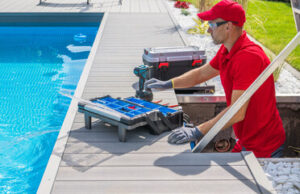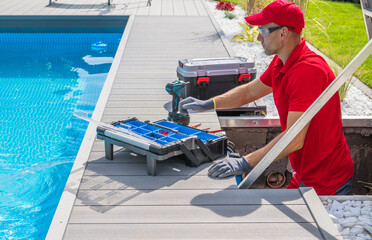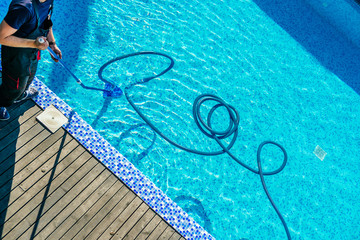Having a swimming pool in your backyard is a luxury that many homeowners enjoy. It provides a refreshing escape from the summer heat, a place to relax and unwind, and a source of entertainment for family and friends. However, owning a pool also comes with the responsibility of proper maintenance and regular pool services to ensure a clean and safe swimming environment.
The range of pool services includes weekly and monthly maintenance visits, checking water chemistry, cleaning and emptying filters, and identifying any problems. Pool techs might also be able to initiate conversations about upgrading equipment like pumps and replastering, making it important that they’re equipped with a payment processor that facilitates sales.

One of the essential pool services is regular cleaning. Pools can quickly accumulate dirt, leaves, debris, and even algae, especially if they are not covered when not in use. Skimming the surface of the pool to remove any floating debris and vacuuming the pool floor to eliminate dirt and sediment are essential tasks to keep your pool clean and inviting. Additionally, brushing the walls and tiles can help prevent the buildup of algae and other contaminants.
Basic Maintenance
The cleaning and treatment of a swimming pool is essential to keep it clean, safe, and enjoyable for all to use. A well-maintained pool could also help extend its life and prevent bacteria growth that would lead to costly repairs down the line. This is why it is important to keep up with regular cleaning and maintenance to get the most out of your investment.
Many professional pool service companies offer a standard monthly maintenance package that usually includes weekly services like water testing and chemical balancing, backwashing filters, skimming the surface of the pool, emptying skimmer baskets, and brushing the walls. However, it is important to understand that each pool and each situation will be different and may require more frequent or less frequent services depending on what the pool needs.
Another service often included in a basic maintenance package is the shock treatment. This is a procedure in which the water is shocked or agitated with a chemical mixture to kill off harmful bacteria and debris that can build up in the pool. It can be dangerous if done improperly, so it is best to let a professional handle it.
If the chemicals in the pool aren’t balanced properly, it can create cloudiness, green water, and even bacterial infections. In this case, a pool service technician will balance the chemicals by adding or taking away certain substances depending on the need. These treatments are typically done bi-weekly or every month, and they will require the use of chlorine or other chemicals that can be expensive.
Other infrequent but important pool maintenance tasks include removing large debris that can easily clog the filter and skimmer basket, vacuuming the bottom of the pool with a vacuum cleaner or leaf rake, and sweeping the deck around the pool twice a year. This is important because it can reduce the amount of dirt that falls into the pool and causes stains.
A final but important service that a pool service may perform is a full scrubbing of the entire pool. This can be a major task and requires scrubbing the floor and walls with muriatic acid to remove any stains or contaminants in the water. It is a good idea to do this every 2-3 years to ensure that the pool is as clean as possible.
In addition to the above services, some pool service providers will also handle maintenance of the surrounding landscaping in and around the pool area. This is a great way to save time and money on lawn care while ensuring that your property is well-maintained and looking its best. Some services will charge for this additional work, but others will offer it as an add-on. It is important to find out if this is an option when you are looking for a pool service provider. This is a great option for homeowners who don’t have the time or energy to handle this task themselves.
Weekly Maintenance
If you’re not interested in a basic monthly package, weekly maintenance services can be arranged for around $30 to $95 for each visit. In this package, the tech will skim the pool water, test and balance the chemicals, clean filters, and skimmer baskets, sweep the deck and brush the walls, and clean the equipment and automatic cleaning systems. The service also includes closing and opening the pool for each season.
This may seem expensive, but it is an essential part of any pool’s care and maintenance. If you aren’t careful, algae and dirt can build up on the bottom of the pool and create murky conditions that make it impossible to swim in. Regularly skimming the surface and brushing the walls can prevent these issues and keep the pool cleaner longer.
Pool vacuuming is another task that can add to the cost of maintaining a pool. Pool service technicians can use manual vacuums attached to long poles to reach the bottom of the pool or an automatic vacuum that moves back and forth in a pattern similar to a robot vacuum. Using the vacuum can remove debris that isn’t easily skimmed or filtered and help to keep the floor of the pool clean.
Other tasks that can be included in weekly maintenance include adding pool chemicals, testing pH levels, cleaning and emptying the skimmer basket, finding leaks, cracks, or equipment issues, and lubricating the plugs on the pump. Some companies even offer water heater servicing. The cost of these services can add to the overall yearly maintenance costs, but it’s important to remember that the pool is an investment and will likely increase the home’s property value.
Some homeowners choose to take on the responsibility of doing some of the maintenance themselves to save money on monthly pool service. However, the time and effort needed to diligently clean a pool week after week quickly adds up. This can make it more financially beneficial to hire a professional company.
The type of pool you have and your location will also affect your yearly maintenance costs. A saltwater pool will require different chemicals than a freshwater pool, and it is usually more expensive to maintain a larger pool. Additionally, cold climates will typically cause you to have to close and winterize your pool more often than if you lived in a warmer area.
Liability insurance can be an additional expense and should be considered when calculating the total price of hiring a pool service company. Most pool companies recommend a minimum of half a million dollars in liability coverage and an umbrella policy to bring the total up to one million dollars. A pool can also increase the cost of homeowner’s insurance, which should be taken into consideration when calculating your yearly maintenance costs.
Maintaining the proper chemical balance in your pool is another crucial aspect of pool services. The right balance of chemicals, including chlorine, pH levels, and alkalinity, helps prevent the growth of bacteria and algae, ensuring a safe swimming environment. Regular testing of the water and adding the necessary chemicals as recommended by a professional pool service provider is vital to keep your pool water clean and clear.
Pool services also include regular inspection and maintenance of pool equipment. This includes checking and cleaning the pool filters, which play a crucial role in removing dirt and debris from the water. Clogged or dirty filters can affect the efficiency of your pool’s circulation system and compromise water quality. Additionally, inspecting and maintaining the pool pump, heater, and other equipment ensures they are functioning correctly and helps prevent costly repairs or replacements down the line.
Another important aspect of pool services is maintaining the pool’s water level. Evaporation, splashing, and backwashing can cause the water level to drop, potentially affecting the pool’s overall performance. Keeping the water level within the recommended range ensures proper circulation and filtration, as well as prevents damage to the pool’s equipment.
Regular pool services also involve inspecting and maintaining the pool’s physical structure. This includes checking for any cracks, leaks, or damage to the pool’s walls, floor, and tiles. Addressing these issues promptly helps prevent further damage and ensures the structural integrity of your pool.
In addition to regular maintenance and cleaning, pool services may also include more specialized tasks, such as pool opening and closing. Opening the pool at the beginning of the swimming season involves removing the pool cover, cleaning and treating the water, and ensuring all equipment is in working order. Closing the pool at the end of the season involves draining the water, winterizing the pool’s equipment, and covering the pool to protect it from the elements.
In conclusion, pool services are essential for maintaining a clean and safe swimming environment. Regular cleaning, chemical balancing, equipment maintenance, and inspection of the pool’s structure are all crucial tasks that ensure the longevity and functionality of your pool. By investing in professional pool services, you can enjoy a clean, well-maintained pool and create lasting memories with family and friends.


